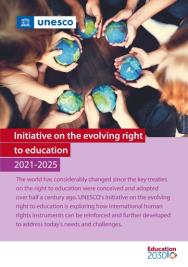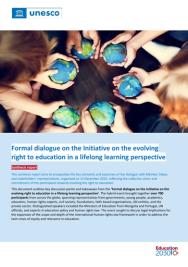
How rights adapt as education evolves
While the central principles of the right to education remain unchanged, stakeholders must constantly interpret and apply human rights norms to reflect the realities of diverse and ever-changing societies. The COVID-19 pandemic, the increased use of technology, and climate change are some of the causes of the seismic shifts occurring in our education systems. As part of the 10th consultation on the 1960 Convention against Discrimination in Education Member States highlighted new challenges as well as existing barriers to the right to education (see full report). These emerging challenges were captured in a report launched by UNESCO’s Futures of Education Initiative that aims to broaden our understanding of the right to education towards lifelong learning by reimagining the nature of learning and the spaces we learn in.
Dialogue opened on the evolving right to education
In December 2021, UNESCO convened an international seminar on the evolving right to education to start a dialogue around which aspects of the right to education framework may need to be reframed in the light of 21st century trends and challenges.
Six evolving dimensions were identified for review:
UNESCO believes that the traditional view of education as aimed at children and young people is outdated. Education is not separate from life but is lifelong and lifewide. With longer life expectancies and a fast-changing world, early learning, technical and vocational education and training and diverse learning pathways are an integral part of education throughout life.
The right to lifelong learning is not an explicit right under international human rights law but was cemented in the right to education vocabulary by SDG4, which implores States to ‘promote lifelong learning opportunities for all’ in its headline. It is imperative that the human rights framework be strengthened to ensure equality of opportunities at all levels of education. Governments must prioritize and allocate adequate resources to the lifelong process of learning as well as ensuring that different learning settings and types of learning - formal, non-formal and informal - are better connected. UNESCO works to ensure equality of opportunity by filling the gap in access to learning past formal school age with support for skills training including technology, literacy and decent work and beyond.
In this regard, UNESCO and the Kingdom of Morocco are co-organizers of the Seventh International Conference on Adult Education (CONFINTEA VII) that will take place in June 2022. This is an occasion to take stock of the global efforts made in adult learning and education and examine how the right to education can take these into consideration to clarify existing rights and obligations, especially in light of the Marrakech Framework for Action which is being drafted.
Early childhood care and education (ECCE) is increasingly recognized as an essential element in realizing a wide range of educational, social and economic rights. It enables all children, including the most vulnerable, to start school on an equal footing with their peers and improve overall educational achievement and enhance social equity. While the right to care and nutrition are established in international human rights law, the right to ECCE is not and deserves greater attention.
The international community included Target 4.2 in Sustainable Development Goal (SDG) 4, which calls on States to, 'By 2030, ensure that all girls and boys have access to quality early childhood development, care and pre-primary education so that they are ready for primary education'. Government commitments to reaching this target are measured by monitoring the number of years of free and compulsory pre-primary education guaranteed in legal frameworks (SDG Target 4.2.5)
UNESCO conducted a study to better understand global and regional trends regarding the adoption of free and compulsory pre-primary education. It aims to fill a gap in monitoring and evaluating the impact of the adoption of legal provisions of free and compulsory pre-primary education on a global scale.
Beyond pre-primary education, UNESCO is working to ensure a right-based approach to ECCE. In December 2021, UNESCO launched a Global Partnership Strategy (GPS) for early childhood, and a Call to act together to ensure that quality early childhood care and education, early primary school years, and family education, are available for all children, leaving no child behind. To build on this momentum, UNESCO, in collaboration with Uzbekistan, is organizing an intergovernmental World Conference on Early Childhood Care and Education (WCECCE) to reaffirm the right of the child to quality ECCE from birth and urge Member States’ renewed commitment to, and investment in, the SDG Target 4.2.
- Clarifying the legal framework of ECCE rights: Key components and obligations. Expert workshop meeting report
- Access the report on the right to pre-primary education
- More on UNESCO’s work in early childhood care and education
- Building and strengthening the legal framework on ECCE rights: achievements, challenges and actions for change; thematic report, 2022
The COVID-19 pandemic led to the sudden mass deployment of online distance learning solutions. No country was fully equipped to ensure that all learners could continue their education without disruption, leading to the entrenchment of existing inequalities in many contexts. Digital learning presents valuable opportunities, it can expand the reach of education both geographically and temporally, encourage connection and collaboration and support teachers in delivering inclusive education to the most vulnerable. At the same time, inherent risks are incurred by the widespread use of ICTs in education, particularly with regards to data privacy and online child protection, learner wellbeing and an increasing digital divide. UNESCO is seeking to bring greater clarity on how the right to education applies given the increasing technological changes in education.
All people have the right to non-discrimination and equality in education. Despite progress made over decades, vulnerable groups, such as girls and women, refugees and migrants and persons with disabilities, are more likely to suffer from educational inequalities and face discrimination. The concept of inclusivity in education seeks to overcome these enduring disadvantages and ensure that everyone has equitable opportunities to learn that are adapted to their needs. UNESCO seeks to clarify what rights deserve to be better enshrined in international human rights law to ensure that education systems do not leave anyone behind.
The right to higher education is part and parcel of the right to education requiring states to put in place an enabling environment through legal and policy measures that implement the relevant international obligations and commitments.
Yet, across the globe, inequality and challenges related to access and enrolment persist in higher education, which is often perceived as peripheral to the right to education. Increasingly high university fees, in contradiction with existing human rights obligations to make higher education progressively free, coupled with admissions procedures that do not take into account structural inequalities are preventing many from entering this transformative level of study. The COVID-19 pandemic has also been massively disruptive for more than 220 million students due to university closures worldwide, the majority of whom will never make up for those lost years.
UNESCO seeks to unpack the existing rights and obligations as laid out in international instruments in light of the global trends and challenges in higher education. Specifically, as part of a broader UNESCO IESALC project, and in contribution to the World Higher Education Conference 2022, a policy paper prepared by UNESCO and the Right to Education Initiative aims to assist Member States in making the right to higher education a reality for all.
Education about, through and for human rights is an integral part of lifelong learning and a vital tool in the creation of peaceful and just societies. Human rights are threatened at every stage in life and people need first to understand the human rights that they have, and then be given the tools to advocate for themselves and others around them. Human rights and the building of human qualities such as solidarity, compassion, ethics, and empathy must become central features of the right to education.
Human rights education should be strengthened with an emphasis on developing the skills, attitudes and beliefs needed to uphold rights and empower citizens to take action, with special attention given to climate change education and education for sustainable development. International frameworks must also protect children by prohibiting violence in education, including learning about child abuse and bodily integrity. Human rights education should be mainstreamed throughout education, and better integrated into teacher training and curricula.
Most notably, UNESCO is revising the 1974 Recommendation concerning education for international understanding, co-operation and peace and education relating to human rights and fundamental freedoms, the landmark legal instrument which brought together for the first time peace, international understanding, human rights, fundamental freedoms and education, with the aim of reviving and updating the global consensus around the role of education.
Objective
UNESCO is to develop a global framework on the evolving right to education, covering five dimensions (roadmap with key milestones, policy and research, consultative processes, institutional modalities, communication and advocacy). To achieve this, a research policy paper, which builds on the background document and the findings of the seminar, as well as additional in-depth research, literature review and country experiences, will be produced as a basis to develop the plan.
At the same time consultations will be held with experts, targeted organizations working in the field of education and Member States. Key milestone events, such as the Transforming Education Summit 2022, will also feed into the proposal.

Have your say!
Share your comments, inputs and feedback on the Initiative’s working paper Bringing into focus the future of the right to education.
News















